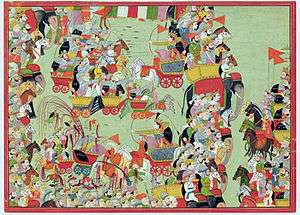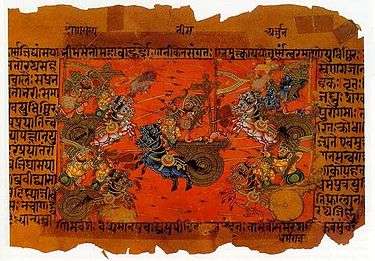Drona Parva

The Drona Parva (Sanskrit: द्रोण पर्व), or the Book of Drona, is the seventh of eighteen books of the Indian epic Mahabharata. Drona Parva has 8 sub-books and 204 chapters.[1][2]
Drona Parva describes the appointment of Drona as commander-in-chief of the Kaurava alliance, on the 11th day of the Kurukshetra War, the next four days of battles, and his death on the 15th day of the 18-day war.[1] The parva recites how the war became more brutal with each passing day, how agreed rules of a just war began to be ignored by both sides as loved ones on each side were slain, how the war extended into the night, and how millions of more soldiers and major characters of the story - Abhimanyu, Jayadratha, Drona, Ghatotkacha - died during the war.[3]
Structure and chapters
This Parva (book) has 8 sub-parvas (sub-books or little books) and 204 adhyayas (sections, chapters).[2][4] The following are the sub-parvas:[1]
- 1. Dronābhisheka parva (Chapters: 1–16)[2]
- With Bhishma fatally injured and on his death bed of arrows, Karna meets Bhishma and asks his permission to join the war. Karna meets Kauravas and consoles them on the loss of Bhishma, then advises Duryodhana to appoint Drona - their teacher - as replacement commander-in-chief for the war. Drona is crowned as the new chief of the Kauravas army. The sub-parva describes various battles, and brutal destruction on both sides.
- 2. Samsaptakabadha parva (Chapters: 17–32)[1]
- Arjuna wins a series of battle, destroys Samsaptakas, and kills Sudhanwa. Drona kills Satyajit. Bhima kills king Anga. Both sides suffer a series of losses, including the deaths of Naraka, Nila and three brothers of Karna.

- 3. Abhimanyu-vadha parva (Chapters: 33–71)[2]
- Abhimanyu starts the day with a series of victories, slaughtering numerous fronts of Kauravas alliance. He defeats Jayadhrata, kills Rukhmaratha. His sweep attracts the focus of Kauravas. Drona collects six warriors and together they attack Abhimanyu, who is later killed by Duhshassana's son.The death of Abhimanyu - the son of Arjuna, shocks Pandavas.
- 4. Pratijna parva (Chapters: 72–84)[1]
- This sub-parva recites the story of Akampana, a tale to console someone who has lost a dear one. Arjuna and Subhadra cry after learning about their son's death. Krishna consoles.
- 5. Jayadratha-vadha parva (Chapters: 85–152)
- Arjuna returns to the battlefield, and unleashes destruction to Kauravas side. Pandavas side suffers losses as well. Jayadratha is killed by Arjuna.
- 6. Ghatotkacha-vadha parva (Chapters: 153–184)[1]
- Duryodhana uses all means of war, fair and unfair, heroic and barbaric, breaks rules of just war when necessary, and causes havoc and major losses on Pandavas side. Drona kills Sivi. Satyaki kills Somadatta. Bhima kills Dhruva, Jayarata, Durmada, Dushkarna, Valhika, seven brothers of Shakuni, ten brothers of Duryodhana, five princes of Gandhari, and many more warriors. Ghatotkacha, the son of Bhima, similarly kills a vast array of Kauravas army formations. Karna and Kauravas focus on Ghatotkacha, killing him. Bhima cries over his son's death, as do other Pandavas. Both sides harden in their stance to destroy the other side.
- 7. Drona-vadha parvha (Chapters: 185–193)[1]
- This sub-book describes how Drona - the teacher who taught both Kauravas and Pandavas brothers - died on the battlefield. Drona mistakenly believes his son Ashwatthama is dead, when an elephant named Ashwatthama dies. Drona in grief becomes vulnerable, which Dhrishtadyumna exploits to kill him. Drona's death sends Kauravas army into panic.
- 8. Narayanastra-mokshana parva (Chapters: 194–204)[2]
- Ashwatthama who just lost his father is upset and angry at the unjust death of his father. He returns to the battlefield and slaughters Pandava army. He uses weapons of mass destruction, so-called the Narayana weapon, in anger. The Narayana weapon has the power to kill everyone who is armed. Krishna realizes the power and scale of the Narayana weapon. He uses his god powers to tell everyone to throw down their weapons, thus saving the Pandavas brothers and their army. Ashwatthama tries to use other weapons of mass destruction as revenge for his father's death, but fails. Sage Vyasa appears and explains to Ashwatthama that he can no longer fight because he is abusing his powers and unjustly using weapons. Ashwatthama retires from the battle field, an action that saves him from the destruction in days of war ahead. Ashwatthama reappears after the war ends, and takes his revenge in Sauptika Parva.
English translations
Drona Parva was composed in Sanskrit. Several translations of the book in English are available. Two translations from 19th century, now in public domain, are those by Kisari Mohan Ganguli[2] and Manmatha Nath Dutt.[1] The translations vary with each translator's interpretations.
Clay Sanskrit Library has published a 15 volume set of the Mahabharata which includes a translation of Drona Parva by Vaughan Pilikian. This translation is modern and uses an old manuscript of the Epic. The translation does not remove verses and chapters now widely believed to be spurious and smuggled into the Epic in 1st or 2nd millennium AD.[5]
Debroy, in 2011, notes that updated critical edition of Drona Parva, after removing verses and chapters generally accepted so far as spurious and inserted with prejudice, has 8 sub-books, 173 adhyayas (chapters) and 8,069 shlokas (verses).[6] He has published a translated version of the critical edition of Drona Parva in Volume 6 of his series.[7]
Quotations and teachings
Dronābhisheka Parva, Chapter 4:
May you be the refuge of your friends, as the ocean is the refuge of the rivers, the sun of the planets, the pious of the truth, fertile soil of the seeds, and Parjannya of the created beings.— Invitation to Karna to join the Kauravas side in the war, Drona Parva, Mahabharata Book vii.4.2[8]
Dronābhisheka Parva, Chapter 4:
In this world, the relationship between the virtuous is more important than a relationship resulting from birth.
Dronābhisheka Parva, Chapter 5:
Another can never see so well what should be done as he seeth it whose concern it is.
Jayadratha-badha Parva, Chapter 148:
Men that are heroic, virtuous and most exalted, having defeated an enemy, neither boast of themselves with harsh words, nor indulge in abusive language.
Ghatotkacha-badha Parva, Chapter 154:
Millions of foot-soldiers and hundreds of millions of horses were pierced with shafts by Drona alone that night.
See also
References
- 1 2 3 4 5 6 7 8 Drona Parva The Mahabharata, Translated by Manmatha Nath Dutt (1897)
- 1 2 3 4 5 6 Drona Parva The Mahabharata, Translated by Kisari Mohan Ganguli, Published by P.C. Roy (1888)
- ↑ Monier Williams (1868), Indian Epic Poetry, University of Oxford, Williams & Norgate - London, page 116–117
- ↑ Drona Parva The Mahabharata, Translated by Manmatha Nath Dutt (1897), Page 375
- ↑ Vaughan Pilikian, Book VII - Vol 1 & 2, The Clay Sanskrit Library, Mahabharata: 15-volume Set, ISBN 978-0-8147-6723-8, New York University Press, Bilingual Edition
- ↑ Bibek Debroy, The Mahabharata : Volume 3, ISBN 978-0-14-310015-7, Penguin Books, page xxiii - xxiv of Introduction
- ↑ Bibek Debroy (2013), The Mahabharata, Volume 6, Penguin, ISBN 978-0-14-310018-8, Drona Parva
- ↑ Manmatha Nath Dutt (1897), Drona Parva, The Mahabharata, Elysium Press, page 6
- ↑ Bibek Debroy (2012), The Mahabharata : Volume 5, ISBN 978-0-14-310017-1, Penguin Books
- ↑ Drona Parva The Mahabharata, Translated by Kisari Mohan Ganguli, Published by P.C. Roy (1888), page 12
- ↑ Manmatha Nath Dutt (1897), Drona Parva, The Mahabharata, Elysium Press, page 252
- ↑ Manmatha Nath Dutt (1897), Drona Parva, The Mahabharata, Elysium Press, page 263
